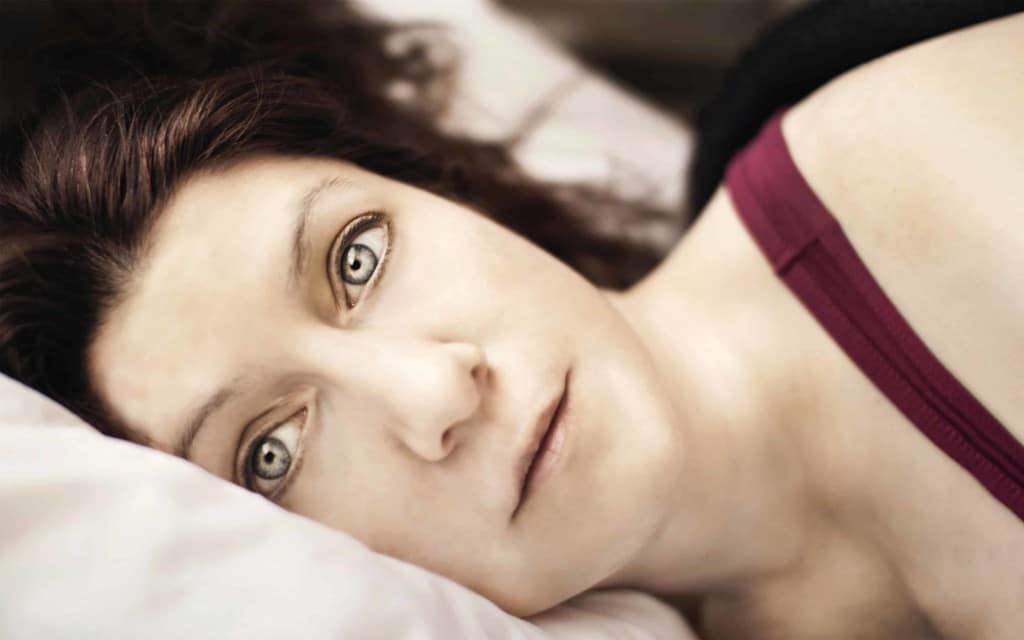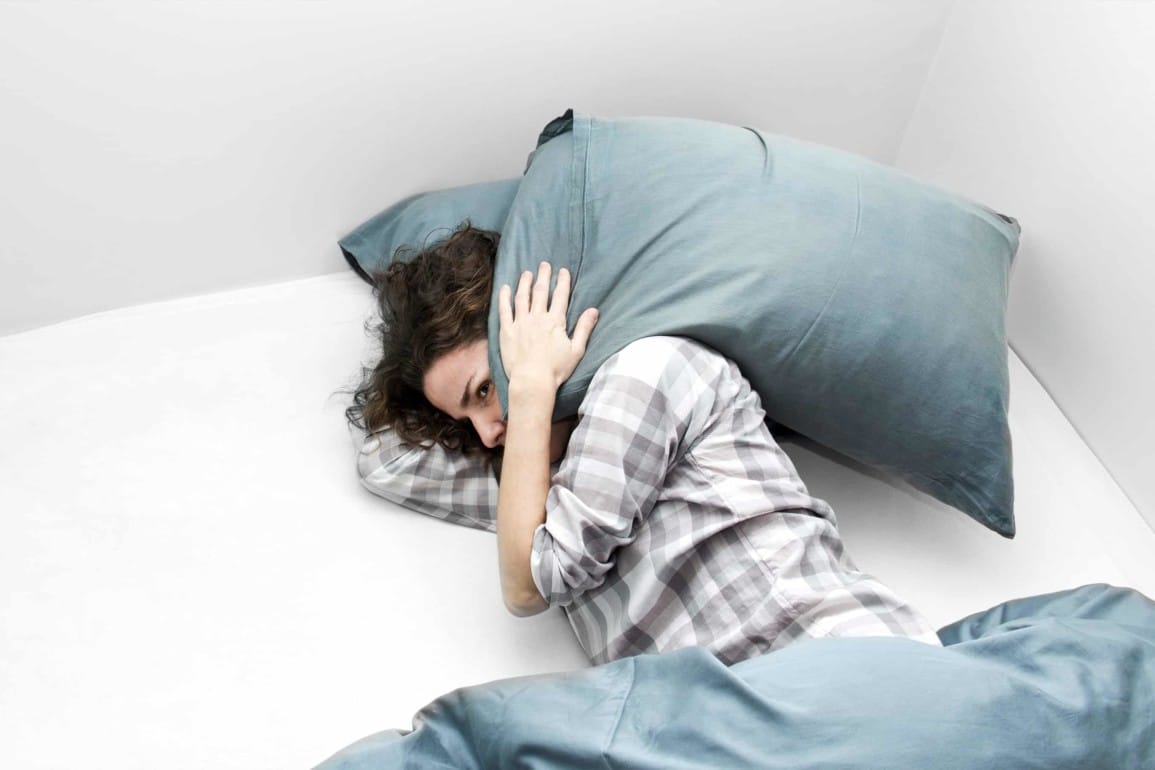Nightmares are a common concern for young children.
During the early years of our lives, it’s common to be plagued by nightmares and disruptive dreams — particularly when your brain is trying to figure out the confusing world around you.
However, just because nightmares are more common in youngsters, doesn’t mean that they can’t or won’t happen for adults too.
While most adults only have bad dreams occasionally, there are a handful of people who experience issues on a consistent basis. These people suffer from a condition called “Nightmare sleep disorder.”
Nightmare disorder is a rare problem that causes severe side effects and symptoms, including an overwhelming inability to sleep, issues with your daily routine, and even enhanced feelings of stress, anxiety, and depression.
Fortunately for people who have this condition, there are ways to improve your quality of life and overcome some of the major symptoms of chronic sleep disturbance.
Today, we’re going to take you through a quick overview of all the nightmare disorder treatments available, and why they’re so effective.

How many people have nightmare disorders?
According to a study in 2018, nightmare disorder affects around 4% of adults.
The chances are that most people will never have to cope with the horror and headaches of persistent and distressing nightmares. Even if you suffer from the occasional nightmare every once in a while, that doesn’t necessarily mean that you have a disorder.
While anyone can have a bad dream — particularly after a poorly-chosen meal, a stressful day, or exposure to a specific medication, people with nightmare disorder have a very different experience.
If you have nightmare sleep disorder, you don’t just wake up once or twice a year with horrible images in your mind. You may have nightmares a few times a week instead.
Crucially, to be diagnosed with nightmare disorder, your bad dreams will need to take place during REM sleep, and they’ll need to be powerful enough to wake you up.
Nightmare disorder causes anxiety, dysphoria, and even depression over time. Over time, the condition destroys your quality of sleep by forcing you to wake up during the deeper stages of your sleep cycle.
This harms your circadian rhythm and disrupts your body clock. Nightmare disorder also disrupts the way that your hormones work, which means that your immune system doesn’t work as well, and it’s harder for you to cope with your emotions.
The other way that nightmare sleep disorder ruins your health is by creating a sense of sleep anxiety. You may feel so nervous about the idea of having a nightmare when you go to sleep, that you start avoiding going to bed at all.
You may stay up all night watching movies or try to drink excessive amounts of alcohol to put yourself to sleep — which creates yet another issue.
Eventually, your fatigue caused by nightmare disorder may become so severe that you struggle to function correctly in any environment. According to sleep disorder experts, the most common symptoms of nightmare disorder include:
- Vivid recurrent dreams that are easy to recall.
- Feelings of fight or flight during sleep, severe fear or worry.
- You feel highly alert when you wake up due to an adrenaline rush.
- The nightmare or sleep disturbance is caused during REM sleep.
- Your mood is altered when you wake from the nightmare.
- You develop avoidant behaviours towards rest.
- Your exhaustion levels rise, and energy levels drop during the day.
- Occupational, interpersonal, and social function suffers.

What causes nightmare disorder?
Now that you know how many people have nightmare disorders, you may be wondering what causes nightmare disorder and whether you may be predisposed to it.
Unfortunately, just like many sleeping disorders, there’s no single cause for nightmare disorder. There’s a chance that anyone could suffer from this condition, regardless of their medical or social background.
One point worth noting is that nightmare sleep disorder is far more common in children. Around 30% of all children experience nightmares frequently — while about 40% experience them occasionally.
Once adulthood begins, nightmare disorder generally becomes less frequent. However, you may be more likely to experience this issue if you also deal with mental health and psychiatric disorders, such as borderline personality disorder, schizophrenia, and even PTSD.
You don’t have to have a mental health issue to suffer from nightmare disorder, however. This condition is also particularly common in people that experience larger amounts of REM sleep.
Because nightmares can only happen in REM, the more time you spend in this stage of sleep, the more likely you are to have a problem.
Other potential causes of nightmare disorder include:
- Chronic stress.
- Trauma.
- Substance abuse (drugs, medication or alcohol).
- Bad sleep hygiene.
- Anxiety and nerves.
Even certain medications, foods, and supplements in your day-to-day life can alter the chemical balance in your body and brain, making it more likely that your mind will respond with vivid and upsetting dreams during the REM stages of sleep.
Medications like beta-blockers and SSRIs commonly interfere with REM sleep, making nightmares more likely.

Nightmare disorder test: Diagnosing somniphobia and night terrors
Doctors and psychologists often have a hard time diagnosing nightmare sleep disorders. It’s not always easy to tell why someone is waking up during the night, or what’s causing them to have such vivid and upsetting dreams.
Most doctors will begin with a routine medical examination. During this meeting with your healthcare provider, you’ll probably need to answer a lot of questions about the kind of foods you eat, the medications you take, and anything that might contribute to your stress or anxiety levels.
There’s no routine test available to diagnose nightmare disorder, although your doctor may recommend having a standard sleep analysis.
A polysomnography test is the most common way to evaluate nightmare disorder and other sleeping conditions.
When you visit a doctor with complaints that your sleep is severely disturbed, they’ll usually recommend using an overnight study so that someone else can monitor your oxygen intake, brain waves, and other physiological factors.
Monitoring you overnight ensures that doctors can see the factors that might be contributing to your disorder. Doctors may also examine any symptoms that you appear to have during the day alongside your sleep issues.
For instance, if you regularly suffer from states of stress and anxiety, then your doctor will often start by trying to treat these conditions before they look into other things that might be causing your nightmares. After all, anxiety and stress are some of the most common causes of sleep disturbances.
To ensure that you get the most out of any appointment to evaluate nightmare disorder, be prepared for your meeting. Make a note of any symptoms that you want to cover and consider keeping a diary of all your sleep experiences for a few weeks before your appointment.
The more you can tell your doctor about your sleep cycle, what you dream about, and the factors affecting your nightmares, the easier it will be to find the right nightmare disorder treatments.

Common treatment options for nightmare disorder
Nightmare disorder is an upsetting condition that’s very difficult for most people to manage. Even an occasional nightmare has the potential to be deeply upsetting and troubling.
If you add the consistency of recurring dreams and consistently inadequate sleep to the mix, then you can see how nightmare sleep disorder can make waking life a living hell.
The good news is that there are some incredibly effective treatments available for nightmare disorder. Your doctor or healthcare provider will be able to suggest a treatment plan based on your background and symptoms.
What medication is used to treat nightmares?
For people who are seriously fatigued and exhausted, the most common option will be to start with some basic medications, then add in psychological treatments at a later date, or at the same time.
Often, medication is a quick treatment option chosen to reduce the risk of things like depression and suicidal thoughts caused by exhaustion.
Additionally, using medication initially can be a great way to give patients some of the extra rest they need so that they can think more clearly.
Many psychological treatments involve getting to the bottom of the reason for your nightmares. It’s challenging to do this when you can’t focus on anything in particular. Some of the most common medications used for nightmare disorder include:
- Clonidine.
- Gabapentin.
- Fluvoxamine.
- Prazosin.
- Trazodone.
The most well-researched and effective treatment is usually Prazosin. This substance is intended to treat not just sleeping problems, but high blood pressure, PTSD, and anxiety too.
The medicine your doctor recommends will depend on whether you have any additional conditions alongside nightmare disorder to consider.
Many of the treatments mentioned above can help with similar problems like high blood pressure, anxiety, OCD, and depression.
Whether a medication is prescribed or not, your doctor will also usually provide an additional form of treatment in the form of a psychological solution for nightmare disorder. For instance, effective options include:
Image Rehearsal Therapy (IRT)
Image Rehearsal Therapy is probably the most highly recommended nightmare disorder treatment. This strategy involves using CBT and psychological methods when you’re awake to change the pattern of your dreams.
To make the most of IRT, you’ll need to write down your dream, with as much detail as you can remember.
As you recall your nightmare, you change the scenarios, by adapting the theme, storyline, or ending to be something more positive.
For instance, if you’re dreaming that you’re being chased by paperwork in your office, you adjust that dream so that you’re fighting the paperwork with a giant shredding machine. It’s all about telling your mind that you can take a different approach in your dreams.
Rehearsing the scenario that you come up with for a few minutes per day can improve your chances of actually changing your dreams at night too.

Eye Movement Desensitization Reprocessing (EMDR)
Another conventional nightmare disorder treatment is EMDR. This strategy combines factors from various different therapies. Usually, it’s best for people who suffer from nightmares caused by exposure to traumatic events.
With EMDR, your therapist uses a multi-step approach to induce disturbing experiences and memories, then helps you to overcome those issues.
The process involves stimulating neural mechanisms that are very similar to the ones that you use during REM sleep. Sound, imagery, and other triggers are a great way to boost the experience of dreaming and tap into your subconscious mind.
Clients in EMDR identify and process the disturbing memory and previous experience. After this they’re less likely to be overwhelmed by the images when they appear in their dreams.
However, although EMDR is a useful treatment for some people — it won’t work for everyone. Your doctor will need to consider your mental state carefully when suggesting this nightmare disorder treatment.
Graded Exposure Therapy (GET)
Graded Exposure Therapy is another conventional treatment for people who regularly suffer from nightmares and trouble sleeping. Some therapists also use this solution to help with things like OCD and PTSD, as well as various fears and phobias.
Otherwise known as systematic desensitization, this treatment involves building resilience to things that upset and frighten you, by gradually exposing yourself to that fear.
The idea is that re-experiencing traumatic memories and dreams will help you to understand what’s causing you so much anxiety and upset.
Your therapist can also provide you with strategies you can use to handle your emotional response to specific thoughts and images. Then you’re less likely to feel as though you’re in danger when you dream about certain things.
Research suggests that graded exposure is an excellent option for reducing the frequency of nightmares. However, it’s most effective when used in combination with other treatments like progressive deep muscle relaxation. Additionally, it’s important to pursue sessions of
Progressive Deep Muscle Relaxation (PDMR)
Another standard nightmare disorder treatment, PDMR is effective at reducing the frequency of nightmares for many people.
Progressive deep muscle relaxation is also excellent in managing stress and anxiety. This treatment involves using a kind of meditation to work sequentially through the muscle groups in your body, looking for opportunities to relax on a physiological level.
Your therapist instructs you to tense your muscles for a few seconds, then release the tension and concentrate on those feelings of relaxation.
When you actively and deliberately tell your body to relax, you send messages to your brain that encourage relaxation too. There are even apps that you can download onto your phone to do this treatment yourself, without the guidance of a doctor or therapist.
Most PDMR treatments include a relaxing voice that guides you through the process with gentle instructions. Just make sure that you speak to a medical professional before starting this treatment for yourself.
If you’re recovering from an injury, you may need to put other precautions in place to avoid any issues with deep relaxation.
Exposure, Relaxation and Re-scripting Therapy (ERRT)
ERRT is a very advanced form of nightmare disorder treatment. Your therapist will guide you through a process that’s designed to help improve your sleeping strategy and make you feel more calm and relaxed when you go to bed.
Often, this process starts with updating your sleep hygiene by removing distracting devices from your bedroom, reducing your exposure to light and noise, and eliminating anything else that may cause anxiety.
ERRT also involves undertaking specific activities as part of your sleeping schedule each night before you go to bed.
For instance, you might use a hot bath and a cup of tea to help yourself relax. Once you have your bedroom and sleeping environment sorted, as well as a healthy sleeping schedule, you apply PDMR techniques to help you relax at night.
Through the day, you’ll also look at re-scripting and problem-solving strategies using techniques similar to IRT. This involves speaking to a therapist about the nature of your nightmares and talking through the steps that you can take to overcome common fears or look at concerns from a different perspective.
ERRT combines multiple crucial treatments into a powerful strategy for improving your sleep.

Is there a cure for nightmare disorder?
As you can see above, there are many options available when it comes to finding treatment for nighttime disorder and sleeping issues. Your doctor will decide whether you need psychological support, medication, or a combination of treatments.
Your doctor may also recommend using basic sleep hygiene strategies to improve your chances of a restful and peaceful night of sleep too.
For instance, having a routine that you follow every night when you go to bed can reduce your chances of disruptions and issues that might increase your risk of a nightmare.
Even cognitive behavioural therapy and other standard treatments for depression and anxiety can help you to get to the bottom of what’s causing your fearful dreams so that you’re not forced to try and deal with underlying traumas and issues in your subconscious.
Though there isn’t any one-size-fits-all cure for nightmare disorder, working with a doctor to recognise the underlying cause of your condition can help you to find a treatment that works for you.
Once you and your medical professional understand what’s causing frequent nightmares for you, it’s possible to implement psychological procedures and daytime coping strategies that keep your risk of bad dreams to an absolute minimum.
To learn more about dreams and nightmares, make sure you subscribe for more regular updates from the team here at siestio.com.
On the other hand, if you’re concerned that your nightmares and sleeping issues are severely affecting your quality of life, seek help from a doctor as quickly as possible.
Siestio. Sleep Matters.
Medical disclaimer
You must not rely on the information provided on our website as an alternative to medical advice from your doctor or other healthcare professionals. For more information read our full disclaimer here.







